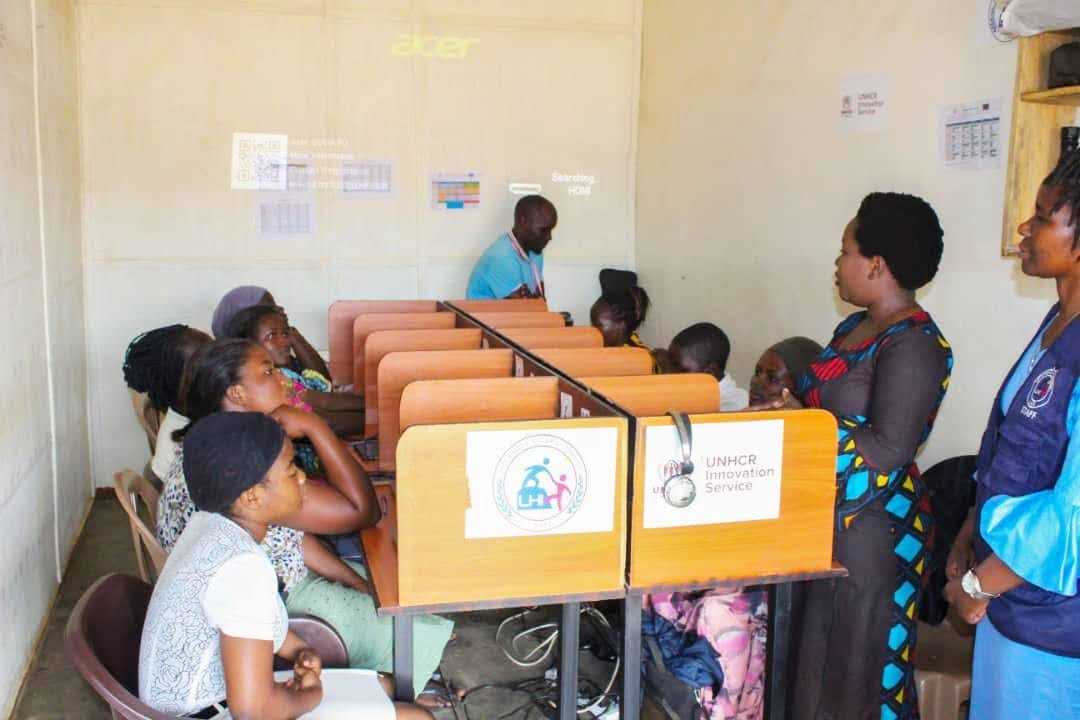Digital Technology
WHAT DOES LHI DO IN DIGITAL INCLUSION? Empowering Communities Through Digital Inclusion: LHI’s Global Approach Let’s Help International (LHI) is at the forefront of bridging the digital divide and empowering marginalized communities through its comprehensive Digital Inclusion programs, implemented in both Uganda and Canada. By focusing on equipping individuals, particularly women, with essential digital skills, LHI fosters economic growth, enhances market visibility, and promotes social inclusion. Key to these efforts are LHI’s innovative platforms, KYAKA-2.COM and RTSW – Refugees’ TV and Stories Worldwide, which play vital roles in expanding digital opportunities and connectivity. Digital Empowerment for Refugee Women-led Businesses in Uganda On May 29th, 2024, LHI launched the “Digital Empowerment for Refugee Women-led Businesses” project in the Kyaka II Refugee Settlement, Kyegegwa District, Uganda. Funded by UNHCR and chosen by UNHCR Innovation Services, this initiative aims to empower 90 refugee women entrepreneurs by providing them with digital skills, mentorship, and resources. The project addresses challenges such as limited market access and a lack of essential ICT skills, equipping these women with the tools needed for sustainable economic empowerment. LHI’s ICT Training Centre in Bukere, Kyaka II Refugee Settlement, Uganda. Capacity Building in Canada In Canada, LHI has partnered with the African Baptist Ministries (ABM) to launch a capacity-building program aimed at equipping marginalized communities, especially newcomers, with vital ICT skills. This program addresses the digital divide that hinders access to education, employment, and essential services. By providing comprehensive digital skills training, LHI empowers participants to overcome barriers and achieve greater independence. LHI & ABM ICT Training Centre in Edmonton, Alberta, Canada. KYAKA-2.COM and RTSW: Enhancing Digital Inclusion Central to LHI’s Digital Inclusion strategy are its sister platforms, KYAKA-2.COM and RTSW – Refugees’ TV and Stories Worldwide, which play crucial roles in connecting refugees and marginalized communities to digital opportunities: KYAKA-2.COM: Empowering Refugees with Online Opportunities KYAKA-2.COM is a dedicated online platform designed to connect refugees in Kyaka II and other settlements with digital resources, educational content, and entrepreneurial opportunities. It serves as a hub for refugees to access information, participate in online training, and engage with a global audience. By providing a space where refugees can learn, share, and grow, KYAKA-2.COM plays a key role in breaking down barriers to digital literacy and economic empowerment. RTSW – Refugees’ TV and Stories Worldwide: Amplifying Voices and Stories RTSW is LHI’s innovative media platform that broadcasts stories, podcasts, and digital courses tailored to the needs of refugees and marginalized communities. By offering free online courses on topics such as smartphone usage, digital communication, and online safety, RTSW transforms smartphones into powerful tools for personal and professional development. Through its YouTube channel and Android app, RTSW makes these resources widely accessible, enabling users to learn at their own pace and according to their needs. Key Objectives Across Programs LHI’s digital inclusion initiatives, whether in Uganda, Canada, or through its online platforms, share common objectives: Equip Participants with Digital Skills: Training covers essential skills such as online safety, effective communication, social media use for advertising, digital literacy, and virtual meeting participation. Increase Market Visibility and Employment Opportunities: By enhancing digital competencies, LHI helps participants increase their online presence, access job opportunities, and improve their economic prospects. Promote Empowerment and Confidence: LHI’s programs build confidence in digital abilities, fostering a sense of empowerment among participants. Implement a Multiplier Effect: The “Train-the-Trainer” model enables those who have completed the training to share their knowledge within their communities, extending the impact of the programs. Implementation and Sustainability LHI’s Digital Inclusion programs are implemented through both online and offline courses. In Uganda, the establishment of a computer training center and the creation of video courses ensure ongoing learning and skill development. KYAKA-2.COM and RTSW provide continuous support and resources, ensuring that participants can access digital opportunities and education long after initial training sessions. In Canada, training sessions are conducted in community centers, focusing on practical, hands-on learning to ensure participants gain the confidence needed to navigate the digital world. Long-term Impact The long-term impact of LHI’s digital inclusion efforts includes sustainable digital skills, economic empowerment, and increased community resilience. KYAKA-2.COM and RTSW extend the reach of these programs, ensuring that digital education and opportunities are accessible to a broader audience, regardless of their location or socioeconomic status. A Global Commitment LHI’s work in digital inclusion spans continents and leverages innovative digital platforms to connect and empower marginalized communities. Through partnerships, cutting-edge training methods, and dedicated platforms like KYAKA-2.COM and RTSW, LHI is making a lasting impact in the lives of those often left behind in the digital age. By breaking down barriers and democratizing access to digital education, LHI is creating a more inclusive and equitable future for all. Capacity LHI Chosen by UNHCR Innovation Services for Digital Empowerment Project in Kyaka II! We are thrilled to share an exciting milestone for Let’s Help International (LHI) that not only marks an achievement for our organization but also promises to bring about significant positive change in the Kyaka II Refugee Settlement. Under the auspices of OPM and UNHCR, LHI is honored to announce that our Digital Empowerment for Businesses led by Refugee Women project has been selected for seed funding and implementation in 2024 through a collaboration with UNHCR Innovation Service. This initiative is part of a broader effort to bridge the digital gender divide, as highlighted in the recent UNHCR Innovation Service article, “Championing Community-Driven Digital Gender Inclusion.”
